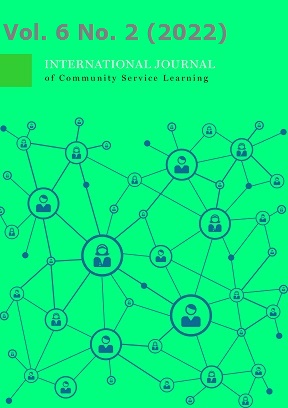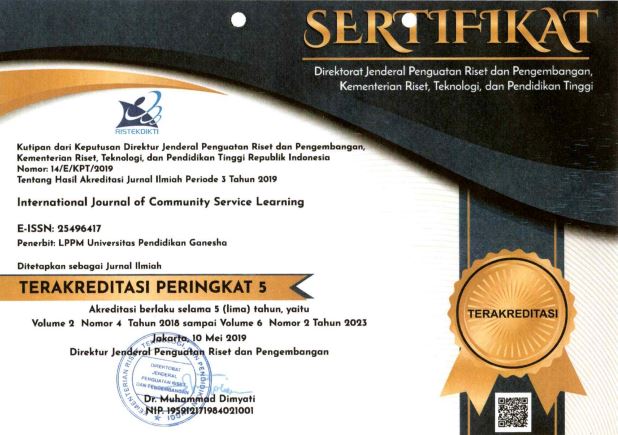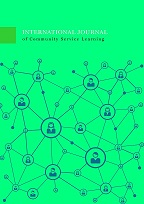Teacher Professionalism Development: Scientific Writing Training for Teachers in Madiun
DOI:
https://doi.org/10.23887/ijcsl.v6i2.48564Keywords:
Training, Teacher, Scientific ArticlesAbstract
Writing scientific papers is a very important activity for a professional and competent teacher in their field. This activity does not only need to be carried out in order to obtain credit scores for promotions or for accreditation purposes, but also to increase the professionalism of teachers. The purpose of this activity is to assist teachers in the district Madiun in improving the professionalism of teachers by producing scientific publications based on the results of the preparation of CAR. The implementation of activities is carried out separately for each teacher with different educational levels. The training is carried out in a planned manner so as to support the goals set. In detail, the series of activities are described as follows: 1. Coordination of the community service team of FKIP UNIPMA with the Education Office of Madiun Regency; 2. The office sends a letter of assignment to the appointed committee and resource persons and determines the date of activities at each level; 3. The committee prepares administrative needs (correspondence, attendance), place of activity, contacting resource persons and providing supporting equipment to support activities; 4. Resource persons carry out activities according to the provisions. Based on the results of the mentoring, scientific papers from 60 participants at every level of kindergarten, elementary and junior high school education have been given recommendations by the team to be continued in scientific publications. All participants produced CAR and scientific articles. 20% of the total scientific articles have been published in scientific journals.
References
Abrahams, I., & Reiss, M. J. (2012). Practical work: Its effectiveness in primary and secondary schools in England. Journal of Research in Science Teaching, 49(8). https://doi.org/10.1002/tea.21036. DOI: https://doi.org/10.1002/tea.21036
Akuma, F. V., & Callaghan, R. (2019). Teaching practices linked to the implementation of inquiry-based practical work in certain science classrooms. Journal of Research in Science Teaching, 56(1). https://doi.org/10.1002/tea.21469. DOI: https://doi.org/10.1002/tea.21469
Baharuddin, M. F., Masrek, M. N., & Shuhidan, S. M. (2019). Innovative Work Behaviour of School Teachers: a Conceptual Framework. IJAEDU- International E-Journal of Advances in Education, 5(14), 213–221. https://doi.org/10.18768/ijaedu.593851. DOI: https://doi.org/10.18768/ijaedu.593851
Bayar, A. (2014). The Components of Effective Professional Development Activities in Terms of Teachers’ Perspective. Online Submissio, 6(2), 319–327. https://eric.ed.gov/?id=ED552871. DOI: https://doi.org/10.15345/iojes.2014.02.006
Berland, L. K., Schwarz, C. V., Krist, C., Kenyon, L., Lo, A. S., & Reiser, B. J. (2016). Epistemologies in practice: Making scientific practices meaningful for students. Journal of Research in Science Teaching, 53(7), 1082–1112. https://doi.org/10.1002/tea.21257. DOI: https://doi.org/10.1002/tea.21257
Brotowidjoyo, M. D. (2002). Penulisan Karangan Ilmiah (2nd ed.). Akademika Pressindo.
Cargill, M., & O’Connor, P. (2021). Writing scientific research articles: Strategy and steps. John Wiley & Sons.
Caswita. (2020). Forum Gumeulis: Upaya Peningkatan Kompetensi Guru dalam Menulis Karya Ilmiah di Kota Tasikmalaya. Andragogi: Jurnal Diklat Teknis Pendidikan Dan Keagamaan, 8(1), 418–429. https://doi.org/10.36052/andragogi.v8i1.122. DOI: https://doi.org/10.36052/andragogi.v8i1.122
Clark, J. S., Porath, S., Thiele, J., & Jobe, M. (2020). New Prairie Press Action Research.
Fatimatuzahroh, F., Nurteti, L., & Koswara, S. (2019). Upaya Meningkatkan Hasil Belajar Peserta Didik pada Mata Pelajaran Akidah Akhlak Melalui Metode Lectures Vary. Jurnal Penelitian Pendidikan Islam, 7(1), 35. https://doi.org/10.36667/jppi.v7i1.362. DOI: https://doi.org/10.36667/jppi.v7i1.362
Ferreira, S., & Morais, A. M. (2020). Practical Work in Science Education: Study of Different Contexts of Pedagogic Practice. Research in Science Education, 50(4). https://doi.org/10.1007/s11165-018-9743-6. DOI: https://doi.org/10.1007/s11165-018-9743-6
Gunawan, I., Triwiyanto, T., & Kusumaningrum, D. E. (2018). Pendampingan penulisan artikel ilmiah bagi para guru sekolah menengah pertama. Abdimas Pedagogi: Jurnal Ilmiah Pengabdian Kepada Masyarakat, 1(2), 128–135. https://doi.org/10.17977/um050v1i2p128-135.
Hawari, A. D. M., & Noor, A. I. M. (2020). Project Based Learning Pedagogical Design in STEAM Art Education. Asian Journal of University Education, 16(3), 102–111. https://doi.org/10.24191/ajue.v16i3.11072. DOI: https://doi.org/10.24191/ajue.v16i3.11072
Heggart, K. R., & Yoo, J. (2018). Getting the most from google classroom: A pedagogical framework for tertiary educators. Australian Journal of Teacher Education, 43(3), 140–153. https://doi.org/10.14221/ajte.2018v43n3.9. DOI: https://doi.org/10.14221/ajte.2018v43n3.9
Ješková, Z., Balogová, B., & Kireš, M. (2018). Assessing inquiry skills of upper secondary school students. Journal of Physics: Conference Series, 1076(1). https://doi.org/10.1088/1742-6596/1076/1/012022. DOI: https://doi.org/10.1088/1742-6596/1076/1/012022
Kasiyan, ), Muria, ) B, Hendri, Z., Handoko, A., Sitompul, M., Program, ), Pendidikan, S., Rupa, S., Bahasa, F., & Seni, D. (2019). Pelatihan Penulisan Karya Ilmiah Untuk Peningkatan Profesionalisme Guru Writing Training of Scientific Works for Improving Professionalism for Teachers. Jurnal Pengabdian Dan Pemberdayaan Masyarakat, 3(1), 47–54. DOI: https://doi.org/10.30595/jppm.v3i1.3128
Kutluca, A. Y. (2021). Exploring Preschool Teachers’ Pedagogical Content Knowledge: The Effect of Professional Experience. Journal of Science Learning, 4(2), 160–172. https://eric.ed.gov/?id=EJ1292933. DOI: https://doi.org/10.17509/jsl.v4i3.36170
Malik, N., Mudrifah, M., Pramuja, R. A., & Masudin, I. (2021). Pelatihan dan Pengembangan Menulis Karya Tulis Ilmiah Guna Meningkatkan Kreativitas Siswa Tingkat SMP/MTs/Sederajat DI MTs Muhammadiyah 1 Malang. RESONA : Jurnal Ilmiah Pengabdian Masyarakat, 5(1), 87. https://doi.org/10.35906/resona.v5i1.683. DOI: https://doi.org/10.35906/resona.v5i1.683
Martí, O., Moliner, L., & Alegre, F. (2022). When CLIL is for all: Improving learner motivation through peer-tutoring in Mathematics. System, 106(February), 102773. https://doi.org/10.1016/j.system.2022.102773. DOI: https://doi.org/10.1016/j.system.2022.102773
Muhsinah Annisa, Hariyanti Hamid, K. (2016). Pengembangan Profesionalisme Guru Melalui Di Wilayah Pedalaman. Widya Laksana, 5(2), 81–84. https://doi.org/10.23887/jwl.v5i2.9054. DOI: https://doi.org/10.23887/jwl.v5i2.9054
Mutiani, H. S., & Putra, M. A. H. (2020). Improvement of Scientific Attitudes Through Training of Social Science Scientific Writing in MAN 2 Model Banjarmasin. Bubungan Tinggi: Jurnal Pengabdian Masyarakat, 2(2), 128–133. https://scholar.archive.org/work/nonj5vnm4zbkhc4d2jeccip2wy/access/wayback/http://ppjp.ulm.ac.id/journals/index.php/btj/article/download/2230/pdf.
Noorjannah, L. (2014). Pengembangan Profesionalisme Guru Melalui Penulisan Karya Tulis Ilmiah Bagi Guru Profesional Di Sma Negeri 1 Kauman Kabupaten Tulungagung. Jurnal Humanity, 10(1), 11406. https://doi.org/10.20527/btjpm.v2i2.2230. DOI: https://doi.org/10.20527/btjpm.v2i2.2230
Norahmi, M. (2017). 21st-century teachers: The students’ perspectives. Journal on English as a Foreign Language, 7(1), 77. https://doi.org/10.23971/jefl.v7i1.538. DOI: https://doi.org/10.23971/jefl.v7i1.538
Pardede, O. B., & Ariga, H. P. S. (2018). Analisis Faktor-Faktor Kendala Penulisan Karya Tulis Ilmiah dan Dampaknya terhadap Motivasi Meneliti oleh Guru di SMP se-Kecamatan Medan Selayang. Prosiding Seminar Nasional Pendidikan Bahasa Dan Sastra Indonesia I Unimed-2018, 1, 71–77. http://digilib.unimed.ac.id/id/eprint/38762.
Praheto, B. E., Andayani, Rohmadi, M., & Wardani, N. E. (2020). The effectiveness of interactive multimedia in learning Indonesian language skills in higher education. Rupkatha Journal on Interdisciplinary Studies in Humanities. https://doi.org/10.21659/rupkatha.v12n1.34. DOI: https://doi.org/10.21659/rupkatha.v12n1.34
Prince, R., & Frith, V. (2020). An investigation of the relationship between academic numeracy of university students in South Africa and their mathematical and language ability. ZDM - Mathematics Education, 52(3), 433–445. https://doi.org/10.1007/s11858-019-01063-7. DOI: https://doi.org/10.1007/s11858-019-01063-7
Raehan, R., Arizona, K., & Bahtiar, B. (2020). Penerapan Pembelajaran Berbasis Masalah Untuk Meningkatkan Penguasaan Konsep Dan Keterampilan Berpikir Kreatif. Journal of Teaching and Learning Physics, 5(1), 35–40. https://doi.org/10.15575/jotalp.v5i1.5755. DOI: https://doi.org/10.15575/jotalp.v5i1.5755
Rosa, A. T. R. (2020). Teacher Development Potential (Creativity and Innovation) Education Management in Engineering Training, Coaching and Writing Works through Scientific Knowledge Intensive Knowledge Based on Web Research in the Industrial Revolution and Society. International Journal of Higher Education, 9(4), 161–168. https://eric.ed.gov/?id=EJ1258955. DOI: https://doi.org/10.5430/ijhe.v9n4p161
Rusilowati, U., & Wahyudi, W. (2020). The Significance of Educator Certification in Developing Pedagogy, Personality, Social and Professional Competencies. 409(SoRes 2019), 446–451. https://doi.org/10.2991/assehr.k.200225.095. DOI: https://doi.org/10.2991/assehr.k.200225.095
Ryve, A., Larsson, M., & Nilsson, P. (2013). Analyzing Content and Participation in Classroom Discourse: Dimensions of Variation, Mediating Tools, and Conceptual Accountability. Scandinavian Journal of Educational Research, 57(1), 101–114. https://doi.org/10.1080/00313831.2011.628689. DOI: https://doi.org/10.1080/00313831.2011.628689
Safitri, D., Sujarwo, & Putra, Z. F. F. (2019). Pemberdayaan Kelompok Guru Dalam Membuat Media Pembelajaran Quizizz. Jurnal Pengabdian Masyarakat, 1(1), 1–6. https://doi.org/10.21009/DSD.XXX.
Sekarwati, A. (2020). Implementasi Pembelajaran Discovery Learning yang Terintegrasi Pendidikan Karakter dalam Pelajaran Biologi. Jurnal Pendidikan Edutama, 7(1). https://doi.org/10.30734/jpe.v7i1.819. DOI: https://doi.org/10.30734/jpe.v7i1.819
Sholihah, T. M., & Lastariwati, B. (2020). Problem Based Learning to Increase Competence of Critical Thinking and Problem Solving. Journal of Education and Learning (EduLearn), 14(1), 148–154. https://doi.org/10.11591/edulearn.v14i1.13772. DOI: https://doi.org/10.11591/edulearn.v14i1.13772
Sodiq, I., Suryadi, A., & Ahmad, T. A. (2014). Program Guru Menulis: Upaya Peningkatan Kompetensi Profesional Guru Sejarah Dalam Penulisan Karya Ilmiah Di Kabupaten Semarang. Rekayasa, 12(1), 42–47. https://doi.org/10.15294/rekayasa.v12i1.5586.
Soedimardjono, F. P. P., & Pratiwi. (2021). Cooperative Learning Model with Jigsaw Type Improves Students’ Sciences Process Skills and Learning Outcomes. JPI (Jurnal Pendidikan Indonesia), 10(1), 172. https://doi.org/10.23887/jpi-undiksha.v10i1.25203. DOI: https://doi.org/10.23887/jpi-undiksha.v10i1.25203
Stehle, S. M., & Peters-Burton, E. E. (2019). Developing student 21st Century skills in selected exemplary inclusive STEM high schools. International Journal of STEM Education, 6(1), 2. https://doi.org/10.1186/s40594-019-0192-1. DOI: https://doi.org/10.1186/s40594-019-0192-1
Suarni. (2017). Melalui Pendekatan Pembelajaran Pakem Untuk Kelas Iv Sd Negeri 064988 Medan Johor. Journal of Physics and Science Learning, 01(2), 129–140. https://jurnal.uisu.ac.id/index.php/PASCAL/article/view/347.
Sumartini, S., Mulyani, M., & Nugroho, B. A. (2019). Workshop Penulisan Karya Ilmiah Bagi Guru Sekolah Dasar di Kabupaten Demak. Jurnal Puruhita, 1(1), 54–59. https://journal.unnes.ac.id/sju/index.php/puruhita/article/view/28644. DOI: https://doi.org/10.15294/puruhita.v1i1.28644
Tsakeni, M. (2021). Preservice Teachers’ Use of Computational Thinking to Facilitate Inquiry-based Practical Work in Multiple-deprived Classrooms. Eurasia Journal of Mathematics, Science and Technology Education, 17(1). https://doi.org/10.29333/ejmste/9574. DOI: https://doi.org/10.29333/ejmste/9574
Utari, D. T., & Mustikawati, R. I. (2017). Implementation of Problem Based Learning Model To Improve Creative Thinking Ability. Jurnal Pendidikan Akuntansi Indonesia, 15(1). https://doi.org/10.21831/jpai.v15i1.14814. DOI: https://doi.org/10.21831/jpai.v15i1.14814
Downloads
Published
How to Cite
Issue
Section
License
Copyright (c) 2022 International Journal of Community Service Learning

This work is licensed under a Creative Commons Attribution-ShareAlike 4.0 International License.

International Journal of Comunnity Service Learning is licensed under a Creative Commons Attribution-ShareAlike 4.0 International License.













